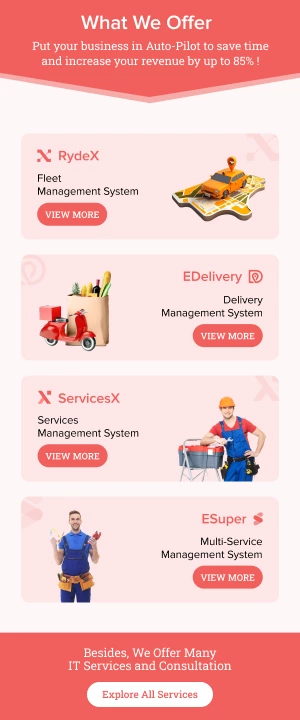
South Africa’s growing population and increasing urbanization have significantly pushed the taxi market forward, presenting rewarding opportunities for new ventures. If you want to capitalize on this booming sector but don’t know how to start a taxi business in South Africa, we can help you.
- A Stepwise Guide on How to Start a Taxi Business in South Africa
- What Are the Legal Requirements to Establish a Taxi Business in South Africa?
- Why Starting a Taxi Business in South Africa is Profitable: Understanding from Market Insights
- Explore Types of Taxi Businesses Operating in South Africa
- Wrapping Up
- FAQs
- Is it profitable to start a taxi business in South Africa?
- How much does it cost to build a taxi booking app in South Africa?
- How can I grow my taxi company after launching?
- What are some major challenges behind starting an online taxi business in South Africa?
- Do I need to be part of a taxi association to operate in South Africa?
We’ve curated this step-by-step guide that explains every nitty-gritty of starting a taxi business. Along with that, you’ll explore the country’s thriving taxi market to gain insights and convincing reasons why starting a taxi business in South Africa could be a profitable venture for you. So, without any delay, let’s get started.
A Stepwise Guide on How to Start a Taxi Business in South Africa
If you’ve decided to plunge into this sector but are unsure how to start a taxi business in South Africa, here’s a complete step-by-step guide to lead you forward.
Step 1: Research Target Audience & Competitors
Before you even announce your plans for starting a taxi business, you must be completely aware of who you are going to serve and who you are going to compete with. That awareness comes through thorough research of the target audience and competitors.
Start by defining your ideal customers. Study their demographics and psychographics to gain a more in-depth understanding. Your goal is to identify their pain points and offer an effective solution in the form of your taxi services.
Similarly, conduct a thorough analysis to understand the competitive landscape. Examine existing taxi businesses and recognize what they are doing well, where they are lacking, and try to create services that help your business stand apart in the South African taxi business sector.
Step 2: Choose the Right Business Model
A business model serves as a blueprint for how a company delivers its services and generates revenue. When starting a taxi business, you’ll come across many options, such as
Platform Model
This is an on-demand business model that connects passengers with independent drivers through a digital platform. In this model, you earn by taking a commission from drivers and platform charges from passengers.
Owned Fleet Model
In this model, you own the vehicles and hire drivers as full-time or contractual employees to offer taxi services. Since you own and operate the business, you get to retain all the revenue generated from rides.
Hybrid Model
This is a combination of both the platform and the owned fleet model. It is suitable for entrepreneurs who want to run an on-demand taxi business with their large fleet, and at the same time, want to enable independent drivers to offer their services.
Step 3: Register Your Taxi Business
Before you go for business registration, choose the most suitable legal entity. Define whether your business is a sole proprietorship, partnership, limited liability company, or corporation. The right structure will give you more clarity on business operations, revenue sharing, and responsibilities.
Once your business’s legal structure is decided, the next step is to register it. This step is easier than most people think. You just need to follow the right process.
Basic Company Registration Requirements
All types of transportation services are required to complete the following registrations and obtain the certificates listed below:
CIPC Company Registration
CIPC is an official government body of South Africa where you register your business. You can visit CIPC’s official website to do it yourself.
COID Letter of Good Standing
Even if your company has one employee, it must be registered at the Department of Labor for COID to cover its employees from work-related injuries.
Tax Clearance Certificate (PIN)
This certificate is used by departments of contractors to confirm a company’s status as SARS (South African Revenue Service).
Unemployment Insurance Fund (UIF)
All employers, including taxi business operators, are required to register for UIF and contribute to it if they employ individuals for more than 24 hours a month.
Skill Development Levy (SDL)
SDL is a compulsory tax that funds skill development in the workforce. The levy is 1% of an employer’s total monthly payroll if it exceeds R500,000.
Step 4: Acquire Adequate Funding
Whether you want to build a traditional cab company or start an online taxi business in South Africa, this venture involves many expenses, including purchasing vehicles, building a digital platform, marketing the company, and more. Having enough financial resources can help you keep your business running.
Even if you’re planning to start your taxi company by bootstrapping, you may need money in the future to scale it. Finances are one of the prominent reasons behind taxi business failures, and therefore, ensure you have sufficient funding to support your venture.
There are several ways to receive financial aid. This includes bank loans, government grants, venture capital, angel investors, and more.
Step 5: Preparing Your Fleet & Drivers’ Team
Choosing the right type of vehicles with correct specifications is essential for regulatory compliance and business efficiency. When it comes to building your fleet, you usually have two options: purchasing the vehicle or leasing it through an agreement. The right option depends on your specific business needs and available funds.
Hiring and training drivers is another crucial step for starting a taxi business in South Africa. Drivers are the face of your business, directly influencing customers; therefore, make sure you hire the right ones with clean background checks. You may also need to train them for customer service or operating an app (if you plan to start an online taxi business in South Africa).
Step 6: Build Your Taxi Booking Platform
Now that you have enough funds to start your taxi business, it’s time to take the most crucial step: building a robust digital platform. Start by finding a reliable team of taxi app developers with a proven track record of delivering successful projects.
Check out their portfolio to evaluate their work quality. Once you finalize your tech team, discuss all your requirements with them. Create a thorough plan with all the key milestones.
Keep a close eye on your app’s UI/UX and functionalities, and provide your suggestions as needed in order to make immediate changes.
Step 7: Launch & Market Your Taxi Business
After continuous cycles of testing and improvements, your app will be ready to be launched on its respective app marketplace. Craft a robust launch strategy to enhance your taxi app’s visibility.
Once launched, you must actively promote it through strategic marketing, both on digital and physical channels. Build a strong brand that sets you apart from competitors. But remember, effective marketing is the one that doesn’t feel like marketing.
Lastly, joining a taxi union is often a necessary step for taxi businesses, especially for the minibus taxi industry in South Africa. These associations bring a range of benefits, like access to routes, operating authority, collective representation, and even business support and development.
Don’t Wait for the Right Time to Start Your Online Taxi Business in South Africa. Just Choose Our Advanced On-Demand Taxi App and Get Started Right Away!
What Are the Legal Requirements to Establish a Taxi Business in South Africa?
Establishing a taxi business in South Africa requires careful adherence to a set of legal requirements, primarily governed by the National Land Transport Act (NLTA) of 2009.
Failing to comply may result in hefty fines, vehicle seizure, or even lawsuits.
Here’s a comprehensive breakdown of the legal requirements:
Vehicle Standards & Licensing
In order to operate legally in South Africa, your vehicle must comply with regulatory standards and obtain the necessary licenses.
- All commercial vehicles must adhere to the operational life standards, which vary depending on the vehicle taxi business type:
- Metered Taxis: No older than 10 years
- Minibus Taxis: No older than 12 years
- Ride-hailing vehicles: No older than 5-10 years
- Even if the vehicle’s life is below the approved limit, it must pass a roadworthiness inspection annually to stay in operation.
- Each vehicle must be registered and carry a license disc showing permit expiry, vehicle weight, and allowable passenger count.
- Each vehicle must have a Public Operating License.
- Some municipalities also require local permits, especially for metered taxis.
Driver’s Criteria
Whether you hire drivers as full-time employees or contract-based gig workers, they must comply with common regulations set by the South African government.
- A driver must hold a valid South African driving license for more than 1 year
- Their license must match the vehicle category:
- Code B or EB – for small vehicles (sedans, hatchbacks, metered taxis)
- Code C1 or higher – for minibus taxis (12 or more seaters)
- Must pass medical checkup, criminal background check, and traffic violation clarification check
Insurance Requirements
Starting a taxi company in South Africa requires a range of insurance to comply with regulations, protect your business, and ensure passenger safety. Here are some critical coverages you should consider.
- Comprehensive Vehicle Insurance: Covers damage to your taxi vehicle due to accidents, theft, natural disasters, fires, or vandalism.
- Passenger Liability Insurance: Covers injuries and death of passengers while in your taxi.
- Public Liability Insurance: Covers injuries, property damage, or death of third parties caused by your vehicle.
- Employer’s Liability Insurance: Covers workplace injuries or claims from employed drivers.
- Business Interruption Insurance: Covers loss of income during downtime caused by accidents, vehicle theft, or mechanical failures.
Business Permits and Licensing
Starting a taxi business in South Africa, whether a traditional or ride-hailing service, is a highly regulated process. To comply with all the regulations, you must acquire the essential permits and licenses mentioned below:
Professional Driving Permit (PrDP)
This permit is needed if you’re driving vehicles for commercial purposes. You can apply for this permit through your local traffic department. For this, you’ll be asked for a valid driving license, a medical test, and police clearance.
Public Operating License
This license is required for businesses or individuals to operate a public transport company. You can apply from the Department of Transport’s official app, the offices of the National Public Transport Regulator, or any local municipality.
Why Starting a Taxi Business in South Africa is Profitable: Understanding from Market Insights
With increasing urbanization and growth in the tourism sector, South Africa is experiencing a significant boom in the taxi industry. The taxi business market, particularly the e-hailing segment, is expected to rise from USD 1.38 billion in 2025 to USD 3.08 billion by 2030.
The industry is projected to double in size within just five years, indicating the profitability of ride-hailing services in the country. This massive growth is driven by various factors that indicate why starting a taxi business in South Africa could be a rewarding decision.
Here are some prominent reasons that drive the industry growth:
Growing Tourism Sector
The tourism sector in South Africa has witnessed massive growth in recent years. The taxi industry is mainly driven by tourists seeking more efficient and reliable transportation services.
Urbanization and Population Growth
Rapid urbanization in South Africa has created a massive demand for transportation services, creating a substantial market for taxis.
Widespread Adoption of Smartphones and Internet Usage
Extensive access to smartphones and the internet has encouraged people to seek app-based ride-hailing services, posing great opportunities for online taxi businesses in South Africa.
Limited Personal Car Ownership
Many people, including students and working professionals, opt for public transportation as the personal car ownership rate is lower in South Africa, increasing demand for cab services in the country.
Overall, the market expansion showcases a promising future for new taxi ventures. While global giants like Uber have made a strong position in the market, there’s still a lot of scope for entrepreneurs who want to start an online taxi business in South Africa.
Explore Types of Taxi Businesses Operating in South Africa
Before you jump into the South African market, it’s essential to understand what’s working in South Africa and what route you want to take. This market has different taxi services, each having its distinct rules, costs, and opportunities.
Let’s take a look at them.
Types of Taxi Models in South Africa
| Taxi type | What it is | Common for | Ideal for |
|---|---|---|---|
| Minibus taxis | 15-seater vans used for daily traveling | Cities and townships | Higher passenger volume, Daily income |
| Metered taxis | Regular sedan or hatchback taxis that charge distance-based fares | Airports, hotels, CBDs | Leisure travelers, business travelers |
| Ride-hailing | Digital taxi booking apps like Uber or Bolt | Urban areas, suburbs | Younger users, tech-savvy people |
Each model is perfect on its own, but what works best for you depends on where you launch your business, how many cars you own, and who your target audience is.
What could be an ideal choice?
The minibus industry is still a dominant taxi sector in South Africa as it’s more preferred for daily rides. However, it’s highly competitive and often requires you to operate in specific routes. This means you will need a route license and must follow local regulations closely.
Metered taxis were once the most prevalent. However, they are now slowly falling back against app-based services because modern riders prefer live tracking, online payments, pre-booking, and more.
Ride-hailing style taxi services are taking over the position of metered taxis. They are smart, legal, and digital, and most importantly, locally-owned and operated. If you want to start an online taxi business in South Africa, the increasing popularity of ride-hailing apps indicates a positive future.
Wrapping Up
Considering the current market scenario, starting a taxi business can be a rewarding venture. This guide was designed to discuss some key steps in creating a successful taxi company. Now that you have all the information on how to start a taxi business in South Africa, it’s time to put your knowledge into practice and build a thriving business.
At Elluminati, we offer an innovative white-label taxi app that helps you build a profitable taxi business. Our platform offers advanced features and operational tools to support efficient scaling, allowing you to build a profitable venture. Contact us today to discover how our solution can support your business growth.
FAQs
Absolutely. With growing urbanization, increasing tourism, and changing customer demands, the taxi market is expanding at a rapid pace. This offers lucrative opportunities for entrepreneurs to build a profitable taxi business in South Africa.
The starting cost to build a taxi booking app could be R150 000. However, the exact cost of building a taxi app could vary depending on your specific business requirements. It’s better to contact experts and get a personalized quote for a clear cost estimation.
To grow your taxi company after launch, focus on offering a seamless customer experience through excellent customer service, discounts, and referral programs. Establish a robust online brand presence to attract new customers and retain existing ones.
High operational costs, complex regulations, and increasing competition are among the prominent challenges to starting an online taxi venture in today’s times.
While it’s not a requirement, many taxi businesses, especially those associated with traditional minibus taxi services, find that joining an association is a necessary step to get a route and operating license.









